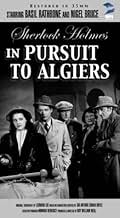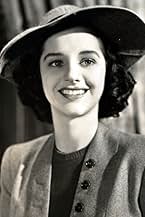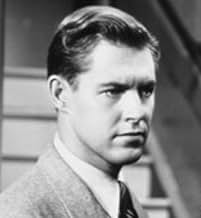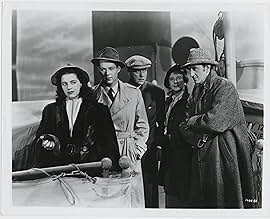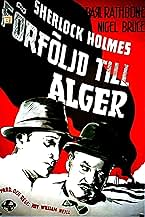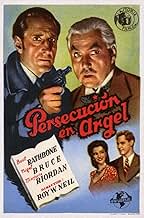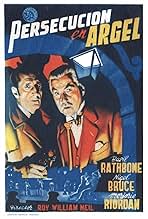IMDb रेटिंग
6.7/10
4.4 हज़ार
आपकी रेटिंग
अपनी भाषा में प्लॉट जोड़ेंHolmes is recruited to escort the heir to a European throne safely back to his homeland after his father's assassination.Holmes is recruited to escort the heir to a European throne safely back to his homeland after his father's assassination.Holmes is recruited to escort the heir to a European throne safely back to his homeland after his father's assassination.
- निर्देशक
- लेखक
- स्टार
William 'Wee Willie' Davis
- Gubec
- (as Wee Willie Davis)
Frederick Worlock
- Prime Minister
- (as Frederic Worlock)
Wilson Benge
- Clergyman
- (बिना क्रेडिट के)
Sven Hugo Borg
- Johansson
- (बिना क्रेडिट के)
Ernst Brengt
- Ship Passenger
- (बिना क्रेडिट के)
James Carlisle
- Aide
- (बिना क्रेडिट के)
Ashley Cowan
- Steward
- (बिना क्रेडिट के)
James Craven
- Anton Petzval
- (बिना क्रेडिट के)
फ़ीचर्ड समीक्षाएं
I've seen nearly all of Universal's Sherlock Holmes series by now, and have found that the level of quality doesn't vary too much between each instalment. Every entry in the series is worth watching, and I haven't seen any that I would describe as 'bad'. Pursuit to Algiers fits into this equation snugly, but even so; it's definitely one of the lesser Holmes mysteries. It does feature most of what makes the series great beyond the central plot line - such as a great performance from both the leads, a constant stream of intrigue and some great dialogue; but the actual mystery itself is rather lazy. It simply follows Holmes and Watson looking after a prince onboard a ship full of assassins. Adding to this is the fact that the sets are fairly samey, which doesn't help the film as it a few changes of scenery wouldn't have gone amiss. The film seems to know that it isn't the greatest of Holmes mysteries as well; and this translates to the screen. Holmes himself doesn't appear in the film for a proportion of the running time, which is never good when he's the main reason people are watching; and as good as Nigel Bruce is, he's not enough to carry a film about the great literary detective all on his own. I much prefer it when LeStrade features as well. Still, despite it's bad points, Pursuit to Algiers is a worthy yarn and still worth seeing for fans of these films.
The Sherlock Holmes Series is actually fun for the fans of Basil Rathbone and Nigel Bruce, but the individual films are a mixed bag as mysteries themselves. The best mysteries are THE SCARLET CLAW, THE HOUSE OF FEAR, THE ADVENTURES OF SHERLOCK HOLMES, THE HOUND OF THE BASKERVILLES, SHERLOCK HOLMES FACES DEATH. The ones about the war are mediocre - more like curiosities dealing with patriotism and the war effort. After the war the series resumed plots dealing with regular crime. The best of these was THE PEARL OF DEATH, but it was not up to the top five films. One of the final films was this one, PURSUIT TO ALGIERS.
Although all the other films were rewritten from the original Conan Doyle stories, PURSUIT TO ALGIERS was totally made up from a comment dropped in the original "Canon". Doyle wrote four novels and fifty six short stories about Holmes. But in this material (equal in size to say LES MISERABLES or DON QUIXOTE) were many little comments and statements that actually have helped lead to the myriad of essays and books by Holmes' fans. Among other things are the large number of cases of Holmes that he or Watson mention casually, but never write of. In this film, the untold story is "the affair of the steamship "Friesland" that so nearly cost us both our lives". It is mentioned in one of the stories of the series called THE RETURN OF SHERLOCK HOLMES, and is usually said to be set in 1895. The actions of PURSUIT TO ALGIERS take place on the steamship "Friesland", and do almost cost Holmes and Watson their lives, but this film is set after the end of World War II. Since there was no real short story that is nothing to be critical about.
Holmes is not in part of the film (and at one point it seems he has been killed), but he does appear about the middle, and he is in good form when he is. Witness the way he takes care of Martin Kosleck, and the way he makes a typically ironic comment to Kosleck as to why he was able to be prepared. Also the business about party favors is quite nicely done. So are the supporting parts - especially Bruce's comments regarding Rosalind Ivan and John Abbott and his partner. As an entertainment it is a fine film. As a mystery it really never gets very involving. We never understand who is in the background backing the anti-royal assassins. Presumably the Communists (this is 1945), but such a guess is based on the number of Eastern European monarchies that fell following the end of World War II. Still it would help to know who the super-villain is. But then Hitchcock always ignored the central rationales of his "MacGuffins". Why not on this lesser level then? So forget the pleasure of realism, sit back, and just enjoy the antics of the characters. And keep in mind, Basil and Nigel made only two other of these films afterward. It was nearly the end of the series for them and their fans.
Although all the other films were rewritten from the original Conan Doyle stories, PURSUIT TO ALGIERS was totally made up from a comment dropped in the original "Canon". Doyle wrote four novels and fifty six short stories about Holmes. But in this material (equal in size to say LES MISERABLES or DON QUIXOTE) were many little comments and statements that actually have helped lead to the myriad of essays and books by Holmes' fans. Among other things are the large number of cases of Holmes that he or Watson mention casually, but never write of. In this film, the untold story is "the affair of the steamship "Friesland" that so nearly cost us both our lives". It is mentioned in one of the stories of the series called THE RETURN OF SHERLOCK HOLMES, and is usually said to be set in 1895. The actions of PURSUIT TO ALGIERS take place on the steamship "Friesland", and do almost cost Holmes and Watson their lives, but this film is set after the end of World War II. Since there was no real short story that is nothing to be critical about.
Holmes is not in part of the film (and at one point it seems he has been killed), but he does appear about the middle, and he is in good form when he is. Witness the way he takes care of Martin Kosleck, and the way he makes a typically ironic comment to Kosleck as to why he was able to be prepared. Also the business about party favors is quite nicely done. So are the supporting parts - especially Bruce's comments regarding Rosalind Ivan and John Abbott and his partner. As an entertainment it is a fine film. As a mystery it really never gets very involving. We never understand who is in the background backing the anti-royal assassins. Presumably the Communists (this is 1945), but such a guess is based on the number of Eastern European monarchies that fell following the end of World War II. Still it would help to know who the super-villain is. But then Hitchcock always ignored the central rationales of his "MacGuffins". Why not on this lesser level then? So forget the pleasure of realism, sit back, and just enjoy the antics of the characters. And keep in mind, Basil and Nigel made only two other of these films afterward. It was nearly the end of the series for them and their fans.
Stolen emeralds, an endangered prince, a fog-bound steamship, a plane crash, a revolver hidden in a purse. Through a clever series of encounters, which Sherlock Holmes deciphers with his usual sharp intellect, Holmes and his dear friend, Doctor Watson, are directed to a specific address at a specific time in a foggy London back alley; there, Holmes is engaged by a group of foreign gentlemen to escort an important personage from England back to his home country. While Holmes and Watson do not battle spies in "Pursuit to Algiers," the sleuths do return to matters of foreign intrigue. Leonard Lee wrote the first of two Holmes screenplays for this, the tenth in Universal's Sherlock Holmes series. Lee's screenplay is light on suspense, and, despite the assured direction of veteran Holmes' director Roy William Neill, the film can only be rated better than average among the Rathbone-Bruce movies.
Despite some sinister fog-shrouded scenes in London's back streets, cinematographer Paul Ivano shoots most of the film aboard the S.S. Friesland, a steamer bound for Algiers. While interior shots are crisp black-and-white images, the deck scenes are murky and layered with obviously fake fog. Although the producer-director and the two above-the-title stars are back, not only the writer and cinematographer, but most of the supporting cast are fresh faces in the series. Basil Rathbone and Nigel Bruce are in good form, and Watson is given a bit more to do than usual, including a song entitled "The Bonnie Banks o'Loch Lomond" that spotlights Nigel Bruce's own fine voice; the retelling over dinner of a Holmes adventure, "The Giant Rat of Sumatra;" and a few solo errands of responsibility at Holmes's direction. None of the supporting players stand out, although lovely Marjorie Riordon as a young singer from Brooklyn has a nice voice, and the cold sexually ambiguous Martin Kosleck is appropriately sinister as the knife thrower.
Perhaps after ten episodes the Universal Holmes series had become routine and perfunctory to the participants. The proceedings play out almost entirely aboard a ship, and the plot lacks a single diabolical villain of the caliber of Professor Moriarty or Adrea Spedding, the Spider Woman. However, most Holmes fans should be pleased, and even the sharpest viewers may not guess Holmes's final revelation. While not the best of the series, "Pursuit to Algiers" is good fun and definitely entertaining.
Despite some sinister fog-shrouded scenes in London's back streets, cinematographer Paul Ivano shoots most of the film aboard the S.S. Friesland, a steamer bound for Algiers. While interior shots are crisp black-and-white images, the deck scenes are murky and layered with obviously fake fog. Although the producer-director and the two above-the-title stars are back, not only the writer and cinematographer, but most of the supporting cast are fresh faces in the series. Basil Rathbone and Nigel Bruce are in good form, and Watson is given a bit more to do than usual, including a song entitled "The Bonnie Banks o'Loch Lomond" that spotlights Nigel Bruce's own fine voice; the retelling over dinner of a Holmes adventure, "The Giant Rat of Sumatra;" and a few solo errands of responsibility at Holmes's direction. None of the supporting players stand out, although lovely Marjorie Riordon as a young singer from Brooklyn has a nice voice, and the cold sexually ambiguous Martin Kosleck is appropriately sinister as the knife thrower.
Perhaps after ten episodes the Universal Holmes series had become routine and perfunctory to the participants. The proceedings play out almost entirely aboard a ship, and the plot lacks a single diabolical villain of the caliber of Professor Moriarty or Adrea Spedding, the Spider Woman. However, most Holmes fans should be pleased, and even the sharpest viewers may not guess Holmes's final revelation. While not the best of the series, "Pursuit to Algiers" is good fun and definitely entertaining.
While this is contrived and silly at times, the best part of it, for me, was the fact that everyone knows what Holmes is up to and he still manages to come out on top. There are two plots at work here. One has to do with the transporting of stolen emeralds and the other the transporting of royalty. On numerous occasions, Holmes turns the tables on his adversaries. The dangers are everywhere and his head spins like an owls as he peers over his shoulder, through the fog, and through portholes. He sets up a wonderful ruse. The men who are out to squelch his efforts are really interesting: a mute thug who uses sign language, a wiry Peter Lorre type with a foreign accent, and a sort of Sydney Greenstreet wannabe. Watson becomes enamored with a pretty young singer who is carrying around secrets. He even belts out his own version of "Loch Lomond" and he proves to have quite a beautiful voice. Without giving anything away, Holmes keeps his cards close to his vest until the denouement. He suspects no one; he suspects everyone. I think this is a lesser effort, but still a lot of fun.
The definitive movie Sherlock Holmes is Basil Rathbone; the definitive movie Dr. Watson is Nigel Bruce. Together, these two brilliant actors made fourteen Sherlock Holmes films between 1939 and 1946, most of them loosely based on stories by Arthur Conan Doyle; a few based on Doyle stories in name only. All are thrilling, exciting excursions into the realm of mystery and deductive reasoning, even the later low-budget ones.
The original pairing of the super sleuth with his bumbling if lovable assistant portrayed by Rathbone and Bruce was in "The Hound of the Baskervilles," where star billing went to Richard Greene as Sir Henry Baskerville. The popularity of Holmes and Watson showed the studio that the audience cared more for the two supporting players than for the somewhat stiff Greene. Next time in "The Adventures of Sherlock Holmes," Rathbone and Bruce deservedly received top billing.
During World War II with England in peril from the Luftwaffe, Holmes and Watson were utilized to booster the war spirit. Holmes could be heard at the end of the war-time films haranguing his fellow countrymen and their ally, the United States, about patriotism and gallantry. Winston Churchill was touted as the savior of his nation.
"Pursuit to Algiers," based on Doyle's "The Return of Sherlock Holmes," finds the crafty detective helping escort Nikolas (Leslie Vincent), heir of a foreign country and a target for conspirators, to assume his crown following the assassination of his predecessor. There are many clever scenes involving Dr. Watson unknowingly being used as a decoy to protect Nikolas. When Nikolas' supporters first contact Holmes surreptitiously, they employ a ruse involving a fish and chips cypher, beyond Watson's grasp. In the process Watson is propositioned by a hooker who calls the good doctor, Ducky, much to his chagrin. Holmes takes the high road by plane; Watson takes the low road by boat. There is much chicanery aboard the ship that takes up most of the movie. The ending may come as a surprise for many.
One of the high points of "Pursuit to Algiers" is Watson's story of "The Giant Rat of Sumatra." Entreated by his fellow passengers to tell about one of Sherlock Holmes' greatest adventures, Watson volunteers to entertain all with his giant rat fable. His use of inanimate objects on the table for purposes of illustration to make the exploits he relates more colorful is well worth the price of admission.
There are more songs than usual for a Sherlock Holmes outing. Such traditional Scottish airs as "Flow Gently Sweet Afton," sung by Marjorie Riordan as a girl from Brooklyn named Sheila Woodbury with something hidden in her sheet music satchel and "Loch Lomond," sung by Watson himself, not only serve as icing but are utilized to embellish the plot.
The twelfth in the Sherlock Holmes series and coming at the end of the war, "Pursuit to Algiers" is one of the most entertaining of the lot and there is no rousing speechifying by Holmes at the end. Those speeches were wonderful morale buildings at the time, but are a bit quaint for today's audiences.
The original pairing of the super sleuth with his bumbling if lovable assistant portrayed by Rathbone and Bruce was in "The Hound of the Baskervilles," where star billing went to Richard Greene as Sir Henry Baskerville. The popularity of Holmes and Watson showed the studio that the audience cared more for the two supporting players than for the somewhat stiff Greene. Next time in "The Adventures of Sherlock Holmes," Rathbone and Bruce deservedly received top billing.
During World War II with England in peril from the Luftwaffe, Holmes and Watson were utilized to booster the war spirit. Holmes could be heard at the end of the war-time films haranguing his fellow countrymen and their ally, the United States, about patriotism and gallantry. Winston Churchill was touted as the savior of his nation.
"Pursuit to Algiers," based on Doyle's "The Return of Sherlock Holmes," finds the crafty detective helping escort Nikolas (Leslie Vincent), heir of a foreign country and a target for conspirators, to assume his crown following the assassination of his predecessor. There are many clever scenes involving Dr. Watson unknowingly being used as a decoy to protect Nikolas. When Nikolas' supporters first contact Holmes surreptitiously, they employ a ruse involving a fish and chips cypher, beyond Watson's grasp. In the process Watson is propositioned by a hooker who calls the good doctor, Ducky, much to his chagrin. Holmes takes the high road by plane; Watson takes the low road by boat. There is much chicanery aboard the ship that takes up most of the movie. The ending may come as a surprise for many.
One of the high points of "Pursuit to Algiers" is Watson's story of "The Giant Rat of Sumatra." Entreated by his fellow passengers to tell about one of Sherlock Holmes' greatest adventures, Watson volunteers to entertain all with his giant rat fable. His use of inanimate objects on the table for purposes of illustration to make the exploits he relates more colorful is well worth the price of admission.
There are more songs than usual for a Sherlock Holmes outing. Such traditional Scottish airs as "Flow Gently Sweet Afton," sung by Marjorie Riordan as a girl from Brooklyn named Sheila Woodbury with something hidden in her sheet music satchel and "Loch Lomond," sung by Watson himself, not only serve as icing but are utilized to embellish the plot.
The twelfth in the Sherlock Holmes series and coming at the end of the war, "Pursuit to Algiers" is one of the most entertaining of the lot and there is no rousing speechifying by Holmes at the end. Those speeches were wonderful morale buildings at the time, but are a bit quaint for today's audiences.
क्या आपको पता है
- ट्रिवियाThe film contains a couple of clever in-jokes for Holmes aficionados in the form of references to famous unrecorded cases for the Great Detective: at one point Watson begins to recite the tale of The Giant Rat of Sumatra (mentioned in Conan Doyle's "The Adventure of the Sussex Vampire"); whilst the action takes place aboard the S.S. Friesland (from Conan Doyle's "The Adventure of the Norwood Builder", and alluded to as "a Dutch-American liner" in his Professor Challenger book "The Lost World", though here it has links to Malmö in Sweden). The film also borrows some characters and events from "The Adventure of the Red Circle."
- गूफ़Dr Watson discovers an automatic pistol --- i.e., one with a slide-in ammo-clip instead of a rotating cylinder --- in a lady passenger's handbag. He consistently refers to the handgun as a revolver. An ex-Army officer like Watson, no matter how daft, would never make such an "obvious" mistake.
- भाव
Sherlock Holmes: Possibly, poison is a woman's weapon.
- कनेक्शनEdited into Who Dunit Theater: Sherlock Holmes and Pursuit to Algiers (2021)
टॉप पसंद
रेटिंग देने के लिए साइन-इन करें और वैयक्तिकृत सुझावों के लिए वॉचलिस्ट करें
- How long is Pursuit to Algiers?Alexa द्वारा संचालित
विवरण
- रिलीज़ की तारीख़
- कंट्री ऑफ़ ओरिजिन
- भाषा
- इस रूप में भी जाना जाता है
- Sherlock Holmes in Pursuit to Algiers
- फ़िल्माने की जगहें
- उत्पादन कंपनी
- IMDbPro पर और कंपनी क्रेडिट देखें
- चलने की अवधि1 घंटा 5 मिनट
- रंग
- पक्ष अनुपात
- 1.37 : 1
इस पेज में योगदान दें
किसी बदलाव का सुझाव दें या अनुपलब्ध कॉन्टेंट जोड़ें


